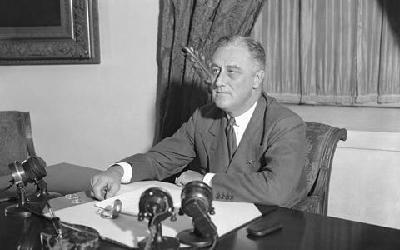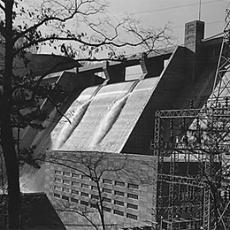
DOUG JOHNSON: Welcome to THE MAKING OF A NATION – American history in VOA Special English.
Franklin Roosevelt's first three months as president was one of the most exciting periods in American politics. Roosevelt entered the White House in March 1933. The nation was in crisis. Banks across the country had closed their doors. The Great Economic Depression was at its lowest point.
Roosevelt and the Congress moved quickly to help people with little food or money. They launched a series of major economic programs.
I'm Doug Johnson with Mario Ritter. This week in our series, we talk about the laws and policies of President Franklin Roosevelt including those known as the "Second New Deal."
MARIO RITTER: Conditions improved within a year after Roosevelt took office. There was no question about that. Banks were open. More people had jobs. Farmers were doing better. And poor people were not so close to disaster as before. However, conditions were far from perfect. Ten million workers still did not have jobs. Young people leaving school were lucky to find any job at all. And most business owners were only earning small profits, if any at all.
After the worst crisis was past, some groups of Americans began to attack Roosevelt and his programs. Conservatives were the first to break with the president. They accused Roosevelt of socialist economic policies.
DOUG JOHNSON: Much more serious to Roosevelt was criticism from reformers within his own party. A number of popular leaders with strong ideas began to attract support from large numbers of Americans. Roosevelt saw his national unity falling apart. Conservatives were accusing him of socialism. Leftist opponents said he was doing too little to end the depression. He saw that he had to change his path.
Roosevelt knew he had little chance to re-gain the support of conservative Americans. His policies were too progressive. So, halfway through his first term as president, he began to support new reforms in an effort to win more support from the left.

MARIO RITTER: The Supreme Court made the president's effort easier. Early in 1935, the court ruled that several of Roosevelt's earlier programs violated the constitution and ordered an end to them. Among them were major programs for farmers and industrial planning.
The court's decisions forced Roosevelt to create new programs and try new ideas. One of his first new actions was to support a plan for government controls on companies that supplied water and produced electricity.
Another was a measure to give jobs to workers. A third new law forced companies doing business with the federal government to pay workers a minimum wage. And the government also began enforcing a new law to control the actions of stock market traders and investment companies.
At the same time, Roosevelt began to attack large companies. He spoke about the importance of small businesses in a democracy. He warned the nation that large companies had too much power. And he called for new actions to increase business competition and control large companies.
DOUG JOHNSON: Roosevelt supported, and Congress passed, two laws during this period that would change the lives of working Americans for years to come. The first law gave more power to labor unions. The second created a federal system to provide money for workers after they retired.
Roosevelt's administration had already supported labor unions in an earlier law. But that law was over-ruled by the Supreme Court. So in 1935, the Congress passed a new law called the National Labor Relations Act.
The act created a national labor relations group to help negotiate agreements between workers and business owners. It gave all workers the right to join or form a labor union. And it ordered business owners to negotiate with a union if it represented most of the workers.
The new law, for the first time, gave unions real power and negotiating rights.
MARIO RITTER: The other very important law passed during this period created the national social security system. The law forced every worker and business owner to pay a small amount of money each month to the federal government. In exchange, the government paid money to workers who had retired or lost their jobs.
The new law did not serve everyone. Farmers, government workers, and a number of other groups were not included in the system. The plan also did nothing to help people who were already unemployed. A person had to have a job after the new system began and then lose it to get money.
However, the national social security law established a system that would grow and become a central part of American life.
DOUG JOHNSON: Roosevelt also supported other new laws during this period that changed the American economy. A banking act gave the nation's central bank -- the Federal Reserve Board -- new power to control the total amount of money in use.
Another law increased taxes for rich people. A third law limited the power of major companies to gain control of local electric utility companies.
The new laws openly challenged the power of big companies, big banks, and big money. Roosevelt rejected the idea that government should cooperate with major companies. Instead, he accused many of the companies of ruining the economy and hurting the working man. He called on Congress to help small companies and the average American.
MARIO RITTER: Perhaps the most important change during this period was that Roosevelt became willing to accept a federal budget that was not balanced. He began to agree with the ideas of Marriner Eccles, the head of the Federal Reserve Bank.
Eccles believed that government had a duty to spend extra money during times of economic crisis. The extra money, he said, would create jobs for more people. They could buy more goods. And this would increase economic growth.
Eccles believed that it was good policy for a government to spend more money than it earned through taxes during such periods. He argued that a growing economy would increase wages and bring in more tax money.
DOUG JOHNSON: Roosevelt's administration had spent more money than it earned ever since it took office. But the president and his advisers did so only to end the economic crisis. They believed that it was a necessary evil. But Eccles and others told Roosevelt that it was not bad for the nation if the government spent more than it earned.
The British economist John Maynard Keynes published an influential book that supported the same policy. And Roosevelt and his top advisers began to accept the new idea.
MARIO RITTER: Roosevelt's economic policies were known as the "New Deal." But the many changes he made during this period became known as the "Second New Deal."
They included some of the most important pieces of legislation in the history of the country, such as the National Labor Relations Act and the Social Security law. And Roosevelt's willingness to accept an unbalanced budget would be the first step toward federal budget deficits that would grow steadily in the years to come.
Budget deficits would jump under President Lyndon Johnson during the war in Vietnam. They would be an important cause of economic inflation in the United States and the world in the 1970s. And Americans would elect Ronald Reagan president in 1980 partly to try to bring federal spending under control.
In 1935, however, most Americans agreed with Franklin Roosevelt that budget deficits were necessary to fight the serious economic depression.
(MUSIC)
DOUG JOHNSON: Our program was written by David Jarmul. I'm Doug Johnson with Mario Ritter. You can find our series online with transcripts, MP3s, podcasts and images at voaspecialenglish.com. You can also follow us on Facebook and Twitter at VOA Learning English. Join us again next week for THE MAKING OF A NATION -- an American history series in VOA Special English.
American history: an angry nation puts its hopes in President Roosevelt
American history: how the Depression put a squeeze on foreign relations
American history: Hoover wins in 1928
American history: nation grows more conservative in '20s
(來源:VOA 編輯:崔旭燕)
